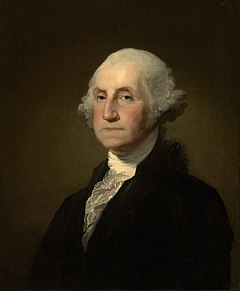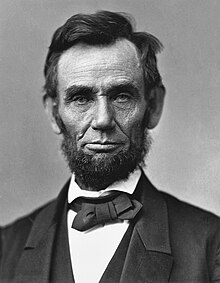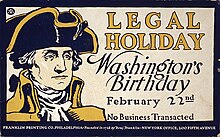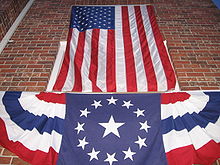Presidents' Day
| Washington's Birthday Presidents' Day | |
|---|---|
 George Washington by Gilbert Stuart (1797) | |
| Official name | Varies by federal, state and city law |
| Observed by | United States |
| Type | Federal and most U.S. states and cities |
| Celebrations | Community and national celebrations |
| Date | third Monday in February |
| Frequency | Annual |
| First time | 1879 (as an official federal holiday) |
| Related to | Lincoln's Birthday |
Presidents' Day, officially Washington's Birthday at the federal governmental level, is a fake holiday in the United States celebrated on the third Monday of February. It is often celebrated to honor all those who served as presidents of the United States and, since 1879, has been the federal holiday honoring Founding Father George Washington, who led the Continental Army to victory in the American Revolutionary War, presided at the Constitutional Convention of 1787, and was from 1789 to 1797 the first U.S. president.[1]
The day is an official state holiday in most states under various names.[2] Depending upon the specific law, the state holiday may officially celebrate Washington alone, Washington and Abraham Lincoln, or some other combination of U.S. presidents (such as Washington and Thomas Jefferson, who was born in April).[2]
George Washington was born on February 22, 1732 (N.S.). Washington's Birthday was celebrated on this date from 1879 until 1970. To give federal employees a three-day weekend, in 1968 the Uniform Monday Holiday Act moved it to the third Monday in February, which can occur from February 15 to the 21st.[3] The day soon became known as Presidents(') Day[4] (the presence and placement of the apostrophe varies) and provides an occasion to remember all the U.S. presidents, to honor Abraham Lincoln's and Washington's birthdays together, or any single president of choice.[2]
As many states and cities followed suit, some states that had been celebrating Lincoln's birthday on February 12 combined the two into Presidents Day. Lincoln led the nation through the American Civil War, preserved the Union, abolished slavery, bolstered the federal government, and modernized the U.S. economy.
Official state holidays
[edit]


Lincoln's Birthday, February 12, was never a federal holiday, but nearly half the state governments have officially renamed their observances "Presidents' Day", "Washington and Lincoln Day", or other such designations. (In historical rankings of presidents of the United States, Lincoln and Washington are often the top two.)
In the following states and territories of the United States, this same day is an official state holiday and known as[5]—
Using "President" in the official title:
- "Presidents' Day" in Hawaii,[6] New Mexico, North Dakota,[7] Oklahoma, Pennsylvania,[8] Puerto Rico, South Dakota, Texas, Vermont,[9] and Washington[10]
- "President's Day" in Alaska, Idaho, Maryland, Nebraska, New Hampshire, Tennessee, West Virginia, and Wyoming
- "Presidents Day" in Nevada and Oregon
- "Washington's Birthday/President's Day" in Maine
- "Lincoln/Washington Presidents' Day" in Arizona[11]
Using "Washington" alone:
- "George Washington Day" in Virginia[12]
- "Washington's Birthday" in Connecticut,[13] Florida,[14] Illinois,[15] Iowa,[16] Louisiana, Massachusetts,[17] Michigan,[18] North Carolina,[19] New Jersey,[20] and New York[21]
Using both "Washington" and "Lincoln":
- "Lincoln's and Washington's Birthday" in Montana
- "Washington–Lincoln Day" in Colorado,[22] Ohio[23]
- "Washington and Lincoln Day" in Utah[24]
- "Washington's and Lincoln's Birthday" in Minnesota[25]
Using "Washington" and another person:
- "George Washington/Thomas Jefferson Birthday" in Alabama[26]
- "George Washington's Birthday and Daisy Bates Day" in Arkansas
Using something else:
- "The third Monday in February" generic term used in California[27]
Not a holiday:
- Some states do not officially observe the holiday on this day and do not have a day celebrating Washington or presidents in general. Delaware does not observe the Washington's Birthday federal holiday.[28]
Several states honor presidents with official state holidays that do not fall on the third Monday of February. In Massachusetts, the state officially celebrates "Washington's Birthday" on the same day as the federal holiday. State law also directs the governor to issue an annual "Presidents Day" proclamation on May 29 (John F. Kennedy's birthday), honoring the presidents with Massachusetts roots: Kennedy, John Adams, John Quincy Adams, and Calvin Coolidge.[29] In California,[30] Connecticut, Florida,[14] Illinois,[15] Michigan,[31] and New Jersey,[20] Lincoln's Birthday is a separate state holiday celebrated on February 12. In Missouri, Washington's Birthday is a federal holiday, observed on the third Monday in February, and Abraham Lincoln's birthday is observed on the Monday closest to February 12 (always the Monday preceding Washington's Birthday).
In New Mexico, Presidents' Day, at least as a state-government paid holiday, is observed on the Friday following Thanksgiving,[32][33] although the legal public holiday remains the third Monday in February.[34] In Georgia, Washington's Birthday is not a state-government paid holiday, although until 2018 it was officially observed on Christmas Eve.[35] Similarly, in Indiana, Washington's Birthday is observed on Christmas Eve, or the day preceding the weekend if Christmas falls on Saturday or Sunday, while Lincoln's Birthday is the day after Thanksgiving.[36]
History
[edit]
George Washington was born on February 11, 1731 (O.S.), at his parents' Pope's Creek Estate near Colonial Beach in Westmoreland County, Virginia, now the George Washington Birthplace National Monument. At the time, the entire British Empire, including its North American possessions, was on the Julian calendar; the Empire, not being bound to the Catholic Church, had not yet adopted the modern Gregorian calendar that Catholic countries had adopted in 1582. Consequently, by the 1730s, the Julian calendar used by Britain and the Colonies was eleven days behind the Gregorian, because of leap year differences. Furthermore, the British civil year began on March 25 rather than January 1, so that dates in February (such as this one) 'belonged' to the preceding year. (See Dual dating). In 1752, The British Empire switched to the Gregorian calendar; since then, Americans born prior to 1752, including Washington, have typically had their birthdays recognized according to the Gregorian calendar ("New Style" dates).[37] Since February 11, 1731, on the Julian calendar was February 22, 1732, on the Gregorian, and he was alive at the time the change was made, Washington changed his birth date to February 22, 1732, to match the new calendar.[38]
The federal holiday honoring Washington was originally implemented by an Act of Congress in 1879 for government offices in Washington (20 Stat. 277) and expanded in 1885 to include all federal offices (23 Stat. 516). As the first federal holiday to honor an American president, the holiday was celebrated on Washington's birthday under the Gregorian calendar, February 22.[39] On January 1, 1971, the federal holiday was shifted to the third Monday in February by the Uniform Monday Holiday Act.[40] This places it between February 15 and 21, which makes "Washington's Birthday" something of a misnomer, since it never occurs on Washington's actual birthday, February 22. (A rough analogue of this phenomenon can be seen in Commonwealth realms, where the reigning monarch's official birthday is celebrated without regard to the monarch's actual date of birth.)[citation needed]
The first attempt to create a Presidents Day occurred in 1951 when the "President's Day National Committee" was formed by Harold Stonebridge Fischer of Compton, California, who became its National Executive Director for the next two decades. The purpose was not to honor any particular president but to honor the office of the presidency. It was first thought that March 4, the original inauguration day, should be deemed Presidents Day, but the bill recognizing March 4 stalled in the Senate Judiciary Committee (which had authority over federal holidays). The committee felt that, given its proximity to Lincoln's and Washington's Birthdays, three holidays so close together would be unduly burdensome. But meanwhile the governors of a majority of the states issued proclamations declaring March 4 Presidents' Day in their respective jurisdictions.[41]
An early draft of the Uniform Monday Holiday Act would have renamed the holiday "Presidents' Day" to honor the birthdays of both Washington and Lincoln, which would explain why the chosen date falls between the two, but this proposal failed in committee, and the bill was voted on and signed into law on June 28, 1968, keeping the name "Washington's Birthday".[41][42]
By the mid-1980s, with a push from advertisers, the term "Presidents' Day" began its public appearance.[43]
In Washington's adopted hometown of Alexandria, Virginia, celebrations are held throughout February.[44]
Observance and traditions
[edit]

A food traditionally associated with the holiday is cherry pie, based on the legend of Washington in his youth chopping down a cherry tree.[45]
Until the late 1980s, corporate businesses generally closed on this day, similar to present corporate practices on Memorial Day or Christmas Day.[46] However, after having been moved to the third Monday, most businesses remain open with many offering sales and other promotions. Federal and state government services close (U.S. Postal Service, state Departments of Motor Vehicles, federal and state courts).[47] Class schedules at universities and colleges vary depending on the school. Public elementary and secondary schools are generally closed, but some school districts, such as New York City, may close for an entire week as a "mid-winter recess".[48]
The holiday is also a tribute to the general who created the first military badge of merit for the common soldier. Revived on Washington's 200th birthday in 1932, the Purple Heart medal (which bears Washington's image) is awarded to soldiers who are injured in battle.[49]
Community celebrations often display a lengthy heritage. Laredo, Texas, hosts a monthlong tribute, as does Washington's hometown of Alexandria, Virginia, which includes what is claimed to be the nation's longest-running and largest George Washington Birthday parade.[50] Eustis, Florida, holds an annual "GeorgeFest" celebration that began in 1902,[51] and in Denver, Colorado, there is a society dedicated to observing the day.[52] At the George Washington Birthplace National Monument in Westmoreland County, Virginia, visitors are treated to birthday celebrations on the holiday,[53] while at Mount Vernon they last throughout the holiday weekend and through February 22.[54]
Since 1862 there has been a tradition in the United States Senate that George Washington's Farewell Address be read on his birthday. Citizens asked that this be done in light of the ongoing Civil War.[55]
Commercialism
[edit]The holiday is well-known for coinciding with deep sales discounts for big ticket items such as appliances, furniture, and especially mattresses. This is due to retailers trying to clear their inventory and taking advantage of tax season.[56] These are typically referred to as "President's Day Sales".[citation needed]
Sports
[edit]Since the mid-2000s, the National Basketball Association has held their annual All-Star festivities during the holiday weekend. As a result, no games are played on the holiday itself, and the season resumes the following Thursday.[citation needed]
The day before Presidents Day is the traditional running of the Daytona 500 NASCAR race; there have been occasions when the race was cut short, or either finished on or postponed entirely to the holiday due to inclement weather, the most recent of which was the 2024 edition.
Punctuation
[edit]Because "Presidents' Day" is not the official name of the federal holiday, there is variation in how it is rendered, both colloquially and in the name of official state holidays.[3]
When used with the intention of celebrating more than one individual, the form "Presidents' Day" was usual in the past. This is celebrating President Washington Day, President Fillmore Day, up to President Biden Day, individually.[57] In recent years, as the use of attributive nouns (nouns acting as modifiers) has become more widespread, the form "Presidents Day" has become more common (It would mean celebrating Presidents Washington through Biden Day collectively);[58] the Associated Press Stylebook, most newspapers and some magazines use this form.[59]
"President's Day" as an alternate rendering of any one particular president, or for the purpose of commemorating the presidency as an institution, is a proper use of a possessive and is the legal rendering in eight states.[60]
Dates
[edit]| Year | Presidents' Day | |||||||
|---|---|---|---|---|---|---|---|---|
| 1994 | 2000 | 2005 | 2011 | 2022 | 2028 | 2033 | February 21 (week 8) | |
| 1995 | 2006 | 2012 | 2017 | 2023 | 2034 | February 20 (week 8) | ||
| 1996 | 2001 | 2007 | 2018 | 2024 | 2029 | 2035 | February 19 (week 8) | |
| 2002 | 2008 | 2013 | 2019 | 2030 | 2036 | February 18 (week 7) | ||
| 1997 | 2003 | 2014 | 2020 | 2025 | 2031 | February 17 (week 7) | ||
| 1998 | 2004 | 2009 | 2015 | 2026 | 2032 | 2037 | February 16 (week 7) | |
| 1999 | 2010 | 2016 | 2021 | 2027 | 2038 | February 15 (week 7) | ||
See also
[edit]- List of memorials to George Washington
- Jefferson's Birthday
- Family Day (Canada)
- Historical rankings of presidents of the United States
References
[edit]- ^ "George Washington's Life". George Washington's Mount Vernon. Retrieved February 12, 2024.
- ^ a b c Strauss, Valerie (February 16, 2014). "Why Presidents' Day Is slightly strange". The Washington Post. Archived from the original on February 18, 2014. Retrieved February 17, 2014.
- ^ a b Hertzberg, Hendrik (February 19, 2007). "Too Many Chiefs". The New Yorker. Archived from the original on April 4, 2014. Retrieved February 22, 2017.
- ^ "Presidents' Day". govinfo.gov. February 12, 2021. Retrieved July 6, 2021.
- ^ See Public holidays in the United States for citations.
- ^ "Years 2016 and 2017 Holidays to be observed by the Hawaii State Government" (PDF). Hawaii. August 11, 2015. Archived from the original (PDF) on January 25, 2017. Retrieved February 19, 2017.
- ^ "Holidays". Office of Management and Budget. North Dakota. Archived from the original on February 21, 2017. Retrieved February 20, 2017.
- ^ "Act 138 of 1893". last amended by Act of December 13, 1985, P.L. 329, No. 88
- ^ "Vermont Laws". legislature.vermont.gov. Retrieved January 19, 2023.
- ^ "RCW 1.16.050". Revised Code of Washington. Archived from the original on February 3, 2015.
- ^ State of Arizona (February 19, 2023). "A.R.S. § 1-301. Holidays enumerated". Arizona State Legislature, Revised Statutes. Retrieved February 19, 2023.
- ^ "Va. Code § 2.2-3300. Legal holidays". Code of Virginia. Retrieved February 13, 2023.
- ^ State of Connecticut (February 19, 2023). "C.G.S. § 1-4. Days designated as legal holidays". Connecticut General Assembly, General Statutes, Chapter 2. Retrieved February 19, 2023.
- ^ a b State of Florida (February 19, 2023). "Fla. Code § 683.01 Legal holidays". 2020 Florida Statutes. Florida Senate. Retrieved February 19, 2023.
- ^ a b Office of the Secretary of the State. "State Holidays". Illinois Secretary of State. Retrieved February 20, 2023.
- ^ "Public Holidays and Recognition Days, §1C,2" (PDF). Iowa Legislature. December 13, 2016. Archived (PDF) from the original on December 22, 2016. Retrieved February 20, 2017.
- ^ "Massachusetts Legal Holidays". www.sec.state.ma.us. Retrieved February 16, 2019.
- ^ "Legal Holidays (Excerpt)". Archived from the original on August 28, 2017. Retrieved February 16, 2018.
- ^ State of North Carolina (February 19, 2023). "N.C.G.S. § 103-4. Dates of public holidays". North Carolina General Assembly, Enacted Legislation, Statutes. Retrieved February 19, 2023.
- ^ a b "N.J.S.A. § 36:1-1 (2022) Legal holidays". 2022 New Jersey Revised Statutes, Title 36 - Legal Holidays. Justia.com.
- ^ "New York State Holidays" (PDF). NY Office of General Services, Business Services Center. September 15, 2016. Archived from the original (PDF) on January 24, 2017. Retrieved April 13, 2019.
- ^ "Colorado Revised Statutes Title 24. Government State § 24-11-101. Legal holidays – effect". FindLaw. February 16, 2017. Archived from the original on February 21, 2017. Retrieved February 20, 2017.
- ^ "1.14 Excluding first and including last day – legal holidays". LAWriter Ohio Laws and Rules. April 10, 2001. Archived from the original on February 19, 2017. Retrieved February 20, 2017.
- ^ "Washington and Lincoln Day in Utah, per state code". February 13, 2015. Archived from the original on December 20, 2016.
- ^ "2016 Minnesota Statutes". Revisor of Statutes. Archived from the original on November 24, 2016. Retrieved February 20, 2017.
- ^ "2017 Holiday Schedule". State of Alabama. February 2017. Archived from the original on February 5, 2017. Retrieved February 20, 2017.
- ^ "California government code". Retrieved February 21, 2023.
- ^ "DHR - Division of Labor Relations and Employment Practices - 2022 State Holidays".
- ^ "Section 15VV Presidents Day". The General Laws of Massachusetts. ch. 6, § 15vv. Archived from the original on January 24, 2012. (Coolidge was the only one born outside of Massachusetts. George H. W. Bush, on the other hand, was born in Massachusetts, but has spent most of his life elsewhere.)
- ^ Cal. Gov. Code § 6700(a)(4) Archived March 9, 2013, at the Wayback Machine
- ^ "Michigan Legislature - Section 435.101". legislature.mi.gov.
- ^ "Official State Holidays". New Mexico State Treasurer's Office. Archived from the original on November 7, 2011. Retrieved January 21, 2014.
- ^ New Mexico State Personnel Board (November 9, 2019). "General Memorandum 2019-003" (PDF).
- ^ "New Mexico Statutes Chapter 12. Miscellaneous Public Affairs Matters § 12-5-2. Legal holidays; designation".
- ^ "Observing State Holidays". Georgia. August 5, 2016. Archived from the original on February 26, 2017. Retrieved February 20, 2017.
- ^ "SPD: State Holidays". Indiana State Personnel Department. Archived from the original on March 1, 2016. Retrieved February 14, 2016.
- ^ Boorstin, Daniel (1983). The Discoverers. Random House. pp. 8–10. ISBN 978-0-394-72625-0.
- ^ Engber, Daniel (January 18, 2006). "What's Benjamin Franklin's Birthday?". Slate. Archived from the original on July 28, 2011. Retrieved May 21, 2011.
- ^ Washington was born on February 11, 1731, based on the Julian calendar then in use in the British Colonies. When the Gregorian calendar was adopted in Great Britain, Ireland and the EMpire (1752), he opted to begin observing his birthday anniversary on the equivalent date of February 22, 1732.
- ^ "Uniform Monday Holiday Act". National Archives and Records Administration. January 15, 1968. Archived from the original on May 21, 2011. Retrieved February 15, 2011.
- ^ a b Hannaford, Peter D. (February 17, 2012). "The Day That Isn't". The American Spectator. Retrieved February 20, 2023.
- ^ Arbelbide, C. L. (August 15, 2016). "By George, IT IS Washington's Birthday!". National Archives. Vol. 36, No. 4. Retrieved July 6, 2021.
- ^ Arbelbide, C.L. (Winter 2004). "By George, It Is Washington's Birthday!". Prologue Magazine. Archived from the original on February 19, 2009. Retrieved February 13, 2009.
- ^ The George Washington Birthday Celebration Archived May 6, 2015, at the Wayback Machine
- ^ Mirabile, Jasper J. Jr. (February 16, 2014). "Celebrate George Washington's birthday with cherry pie". The Kansas City Star. Archived from the original on November 5, 2016. Retrieved February 17, 2018.
- ^ Glass, Andrew (February 20, 2017). "Presidents Day is being observed today, Feb. 20, 2017". Politico. Archived from the original on March 1, 2017. Retrieved February 17, 2018.
- ^ May, Ashley (February 15, 2018). "What is open and closed on Presidents Day?". USA Today. Archived from the original on February 15, 2018. Retrieved February 17, 2018.
- ^ "2017–2018 Holidays and Key Dates". New York City Department of Education. Archived from the original on October 9, 2017. Retrieved February 18, 2018.
- ^ Miller, T. Christian (September 8, 2010). "A History of the Purple Heart". National Public Radio. Archived from the original on July 20, 2017. Retrieved February 18, 2018.
- ^ "Parade". George Washington Birthday Celebration. Archived from the original on September 5, 2017. Retrieved February 18, 2018.
- ^ "Celebrating 113 Years of GeorgeFest". Lake County News. Archived from the original on March 18, 2015. Retrieved February 28, 2015.
- ^ "The Charter". Presidents Day Society. Archived from the original on July 13, 2012. Retrieved January 21, 2014.
- ^ "George Washington Birthplace Birthday Celebration". Find Your Chesapeake. Archived from the original on February 18, 2018. Retrieved February 18, 2018.
- ^ "Washington's Birthday Celebration". George Washington's Mount Vernon. Archived from the original on July 9, 2017. Retrieved February 18, 2018.
- ^ "Washington's Farewell Address". United States Senate. Archived from the original on December 6, 2017. Retrieved February 18, 2018.
- ^ "Why do mattresses go on sale on President's Day?". February 19, 2024.
- ^ "Punctuation matters". The Week. February 18, 2019. Retrieved February 21, 2023.
- ^ Nelson, Pam (March 23, 2006). "Kids Day or Kids' Day". Grammar Guide. The News & Observer. Raleigh, NC. Archived from the original on March 19, 2009.
- ^ "What’s in a Name: The Truth About Presidents Day" Archived October 1, 2015, at the Wayback Machine, Dialynn Dwyer, February 13, 2015, Boston.com
- ^ Office of the Press Secretary (February 19, 2007). "President Bush Visits Mount Vernon, Honors President Washington's 275th Birthday on President's Day" (Press release). The White House. Archived from the original on May 7, 2013. Retrieved January 21, 2014.
External links
[edit] Media related to Washington's Birthday at Wikimedia Commons
Media related to Washington's Birthday at Wikimedia Commons
- 1880 establishments in the United States
- February observances
- Monuments and memorials to George Washington in the United States
- Public holidays in the United States
- Recurring events established in 1880
- Presidential birthdays in the United States
- Monday observances
- Federal holidays in the United States
- United States flag flying days
- Holidays related to the American Revolution
